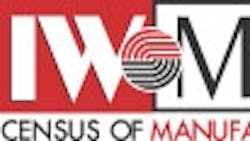Census of U.S. Manufacturers -- Lean Green and Low Cost
The lean revolution is clearly underway within U.S. manufacturing companies, although the jury is still out on what exactly the end result of a lean initiative ought to be. According to the 2007 IW/MPI Census of Manufacturers, nearly 70% (69.6%) of all plants have adopted lean manufacturing as an improvement methodology (see accompanying charts at the bottom of this article). What's more, lean is more than twice as popular as the next closest improvement method, Total Quality Management (34.2%).
Nevertheless, just because something is popular doesn't necessarily mean it's working according to plan, and part of the reason is that manufacturers have a wide variety of expectations when it comes to lean. Most companies believe that lean's main benefits come from cutting costs, but that's a mistaken perception, observes James Womack, founder of the Lean Enterprise Institute. "Lean management is not a quick solution for cost reduction," he points out. "It's a fundamentally different system than traditional management for organizing and managing employees, suppliers, customer relationships, product development, production and the overall enterprise."
Be that as it may, cost reduction strategies are on the rise, with the number of companies focusing on "low cost" up 1.9% from last year. The only other area seeing a bigger gain is "high quality." Conversely, product development strategies are somewhat on the wane, with focus on "product variety" down 2.8%, "customization" off 2.3% and "innovation" down 0.3%.
Continuous improvement programs continue to be the most frequently cited strategic practice, with 76.9% of the respondents, up 4% from a year ago. Not surprisingly, given the increasing awareness of "green manufacturing," environmental management practices saw the biggest percentage increase, up 11.2% from 2006. Energy management also saw a sizable increase in usage, being up 9.4%. A new option this year, recycling and reuse programs, finished comfortably in second place, at 56.1%. The percentage of companies saying they have either made "significant progress" toward or have "fully achieved" world-class status remains unchanged from last year -- 26.1%.
However, an additional 6.8% of the companies report having made at least "some progress" in their quest to become world-class, leaving only 12.8% of the companies as saying they've made no progress at all. All told, 87.2% of the manufacturers in the United States are at the very least aware of what represents world-class for their industries, and are aware of what it'll take to get there.
Methodology
The IW/MPI Census of Manufacturers was conducted in late spring/early summer 2007. We asked more than 100 questions of manufacturers across the United States. There were 433 respondents (164 paper and 269 online), and all responses were anonymous.
The Manufacturing Performance Institute (MPI) is a Cleveland-based research organization specializing in research development, analysis and communications. Details on how to obtain a complete summary of survey results or the complete 2007 IW/MPI Benchmarking Toolkit are available at www.mpi-group.net.
Charts and Tables
Focus Of Market Strategy(multiple responses allowed)(multiple responses allowed)
(multiple responses allowed)
About the Author
Dave Blanchard
Senior Director of Content
Focus: Supply Chain
Call: (941) 208-4370
Follow on Twitter @SupplyChainDave
During his career Dave Blanchard has led the editorial management of many of Endeavor Business Media's best-known brands, including IndustryWeek, EHS Today, Material Handling & Logistics, Logistics Today, Supply Chain Technology News, and Business Finance. He also serves as senior content director of the annual Safety Leadership Conference. With over 30 years of B2B media experience, Dave literally wrote the book on supply chain management, Supply Chain Management Best Practices (John Wiley & Sons, 2010), which has been translated into several languages and is currently in its second edition. He is a frequent speaker and moderator at major trade shows and conferences, and has won numerous awards for writing and editing. He is a voting member of the jury of the Logistics Hall of Fame, and is a graduate of Northern Illinois University.
